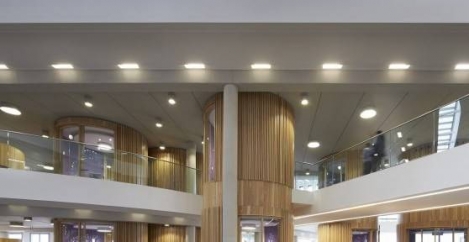December 4, 2014
Most people will continue to work in traditional offices for foreseeable future
[embedplusvideo height=”159″ width=”230″ editlink=”https://bit.ly/1tFAZGG” standard=”https://www.youtube.com/v/eGQb7R7Iudk?fs=1″ vars=”ytid=eGQb7R7Iudk&width=230&height=159&start=&stop=&rs=w&hd=0&autoplay=0&react=0&chapters=¬es=” id=”ep5129″ /]
The office remains the favoured location for work worldwide but there remains an ongoing mismatch between perceptions of the productivity and performance of flexible working employees and the reality, says a major new report from Dell and Intel. According to the Global Evolving Workplace Report based on a survey of nearly 5,000 employees worldwide, the idea that remote workers are less productive is particularly apparent in developed countries. In the UK, people are two times more likely to believe that colleagues who work from home are less rather than more productive. In Germany, 75 percent of respondents saw the ability to work from home as a special privilege. Meanwhile, of those employees surveyed in developing countries, over one-third (34 percent) see home workers as more productive, compared to 32 percent who believe they get less done.
 Two-thirds of British employees say they spend at least 75 percent of their time in the office, and 65 percent say it’s where they do their best work. Almost all (98 percent) employees spend at least some time in the office and a mere 31 percent feel that technology makes them more productive. Over three quarters (76 percent) think the traditional office will outlive them. In Germany, 95 percent spend at least some time every week in their employer’s main workplace and nearly two thirds (65 percent) spend at least three quarters of their time there.
Two-thirds of British employees say they spend at least 75 percent of their time in the office, and 65 percent say it’s where they do their best work. Almost all (98 percent) employees spend at least some time in the office and a mere 31 percent feel that technology makes them more productive. Over three quarters (76 percent) think the traditional office will outlive them. In Germany, 95 percent spend at least some time every week in their employer’s main workplace and nearly two thirds (65 percent) spend at least three quarters of their time there.
The survey covered 4,764 employees of small, medium and large companies worldwide from 12 countries – the US, UK, France, Germany, Japan, Brazil, China, India, Russia, Turkey, UAE, and South Africa, in 9 industries, financial services, manufacturing, retail, media & entertainment, healthcare, education, government, public healthcare and public education. The report explores the following ideas:
- One Size Doesn’t Fit All
- The Office Is King, but it’s a Jungle Too
- The Productivity Debate: Office Workers vs. Remote Workers
- Work Life Plus Personal Life = Life
- The Secret to Happy Employees? Technology
- The Future of Tech in the Workplace is Bright, But Not Fully Automated
The report identifies four key trends as a result.
- The Office Is King, but it’s a Jungle Too: As employees conduct work in different locations, the office still seems to be holding strong as the primary place of work.
- The Productivity Debate: Office Workers vs. Remote Workers: Perceptions of at home workers are shifting as 52 percent of people believe that those working from home are just as productive or more productive than those in the office.
- The Secret to Happy Employees? Technology: One out of four employees globally report they are influenced by the technology provided to them at work and would consider taking a new position if provided better technology that helps them be more productive.
- The Future of Tech in the Workplace is Bright, But Not Fully Automated: Employees are generally optimistic with the future of technology believing it will keep evolving and will provide different benefits and capabilities to the workforce, but will not fundamentally change the way in which people work today.
















